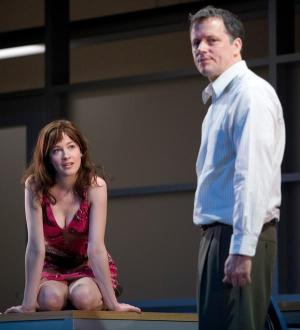Review: 'Blackbird's' Messy Morality
(c) Marin Independent Journal
May 7, 2007
By Charles Brousse
Those two issues - identity and intention - hang in the air throughout the roughly 80-minute (no intermission) playing time of "Blackbird," Scottish playwright David Harrower's controversial work that won London's 2007 Olivier Award for Best New Play. The American Conservatory Theatre is presenting its West Coast premiere at its Geary Street home in a fast-paced production directed by Loretta Greco and starring New York stage and screen actors Steven Culp as Peter/Ray and Jessi Campbell as Una (complimented by brief appearances by a pair of local youths, Portia Juliette and Hannah Rose Kornfeld, who alternate performances). Back to identity and intention. About 10 minutes into the play, it seems the mystery has been solved when Una utters a single sentence that sends shivers through the audience. Fixing her gaze on Peter, who has been flailing about like an insect impaled by a pin, she inquires, "How many other 12-year-olds have you had sex with?" So that's it: Peter, whose former name was Ray, is an abuser of underage children who, years after the incident occurred, is being confronted by one of his victims. As Una describes it, he took advantage of her parents' trust by accepting their invitation to a family barbecue, where he crossed a line by complimenting her appearance. That led to an exchange of notes and meetings in a local park, during one of which he led her into the bushes and coerced her into losing her virginity. To further satisfy his lust, the then-40-year-old took her to an island a short distance off the English coast, where they rented a dingy hotel room and engaged in hours of wild sex. When it was over, Ray excused himself and went out for a walk, from which he never returned. Frightened and feeling abandoned, she spent the rest of the night looking for him, tracing his path from pub to pub. exposing herself to ridicule and physical danger. Finally, someone notified the police, who reunited her with her frantic parents and arrested her abductor. Clearly, we conclude, the man is a monster. Whatever punishment he received, it's not enough. But wait! That's her version. His differs in several important details. While he admits to being attracted by her mature appearance and responses - features also observed by the judge at his trial - when they met in the park, he had no intention of carrying it any further until she disappeared into the bushes and he heard her call out, "Ray, I'm waitingÉ" From that point on, a kind of self-destructive madness overcame him. Although aware it was a criminal act, he brought her to the island, where they satisfied their mutual desires. Then, starting to feel apprehensive about what he had done, he went walking to clear his head and devise a plan to get her home; when he returned to the hotel room, she was gone. After a desperate search, he concluded that his only choice was to surrender to the authorities. As for her insinuation that she was the victim of a serial pedophile, he denies the charge categorically. Nor did he abandon her, as she maintains. On the contrary, he recalls feeling helpless before the sexual power of a girl/woman who seemed to know more about love and passion at 12 years old than he could hope to attain in a lifetime. Losing her was a crushing blow, from which he only slowly recovered. So, who to believe? While Harrower doesn't supply a definitive answer, the diverse reactions of his characters to each other's accounts are telling. It seems that Una's bitterness stems less from being abused than from her hurt at being jilted. Once convinced it was only a misunderstanding, she is quite prepared to resume their relationship as if nothing had happened. For Ray, however, this is a closed chapter. Having paid the price for what he now acknowledges was a mistake, he has a new name, a responsible job and a girlfriend who loves him unconditionally. Summoning up the self-discipline he lacked 15 years earlier, he resolutely resists Una's invitation to reignite their affair by having sex on one of the canteen's formica-topped tables. By casting Steven Culp as Ray, ACT's production also contributes to our dilemma about guilt and innocence. Culp is handsome, clean-cut, personable - an actor whose long list of film and TV credits includes appearances on "Desperate Housewives." Using the play's time line, it's difficult to conceive of him as a 55-year-old sex offender (or even someone who is grateful to work in a warehouse). Quibbles aside, David Harrower's "Blackbird" is a welcome and provocative drama about the dangers of moral dogmatism, a phenomenon much in evidence these days. What: "Blackbird" Where: American Conservatory Theatre, 415 Geary St., San Francisco When: Through May 27, Tuesdays to Saturdays at 8 p.m., Wednesdays, and weekends at 2 p.m. Tickets: $17.50 to $73.50 Information: 749-2228 or go to act-sf.org Rating: Four out of five stars |
DISCLAIMER: This site is a Steven Culp fan site and is not affiliated with Steven Culp, his family or any of his representatives.
Unless otherwise noted, all captures were made by me from videos from various sources. All shows and photos belong to their respective owners.
NO COPYRIGHT INFRINGEMENT INTENDED!
© 2004-2022 SConTV.com and Steven-Culp.com
Unless otherwise noted, all captures were made by me from videos from various sources. All shows and photos belong to their respective owners.
NO COPYRIGHT INFRINGEMENT INTENDED!
© 2004-2022 SConTV.com and Steven-Culp.com
